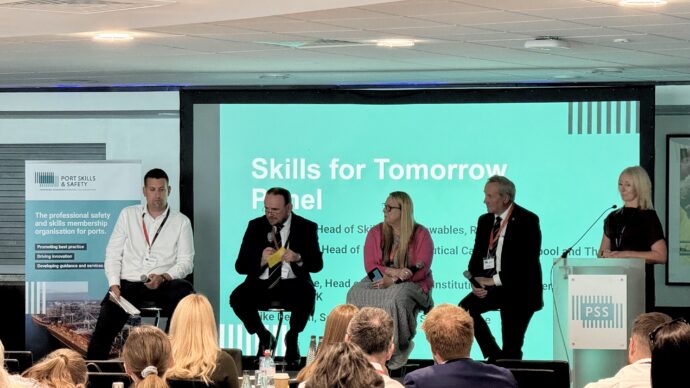NEWS
The future of the UK port sector is about its people
Campaigns |Published: Aug 4, 2025

The future of the UK port sector is not just about infrastructure, technology, or regulation. It’s about people. The Skills for Tomorrow panel discussion at the Port Skills and Safety Annual Members’ Conference 2025 brought this into sharp focus, highlighting both the challenges and opportunities facing the sector, as it works to secure the workforce of tomorrow.
Drawing on insights from EngineeringUK, RenewableUK, Fleetwood Nautical Campus, and Maritime Skills Alliance, the panel explored the growing pressure on ports to keep pace with changing skills demands, from decarbonisation and digitalisation to automation and offshore wind.
According to RenewableUK’s 2025 Workforce Intelligence Report, the UK offshore wind workforce is projected to grow from 32,000 today to over 104,000 by 2030, with around 30% of those roles expected to be port-based or supported through ports. This transformation will reshape coastal economies and skills needs.
The panel were clear that skills development is not optional. It is an essential investment if ports want to remain competitive and sustainable in a rapidly changing landscape. Those not investing in their people will get left behind, not just in capability but in reputation, compliance, safety, and appeal to new talent.
As ports embrace new technologies and play a leading role in the transition to net zero, the workforce needs are shifting rapidly. The panel underscored that future ports will require not just traditional marine and logistics expertise, but also growing numbers of engineers, digital specialists, and technical professionals who can support innovation, resilience, and sustainability.
The current talent pipeline is falling short and is a challenge the sector must urgently address. Too few people outside the sector understand the breadth of roles available, let alone consider a port career for themselves. If action isn’t taken now to expand and energise the pipeline, there is a risk that operational demands will not be met, let alone future ambition. What works is already known, there just needs to be more of it and consistently.
EngineeringUK estimates that the UK will need 173,000 new engineers and technicians every year to meet demand, a gap the port sector cannot afford to ignore. The panel highlighted the ongoing gender imbalance in STEM pathways, emphasising the need to engage earlier with young people, particularly those from underrepresented and diverse backgrounds, to ensure ports are not left behind in the race for talent.
The panel also stressed the importance of not only attracting new talent but creating pathways for lifelong learning, progression, and upskilling, including through higher level apprenticeships, as the demands on the workforce evolve.
A key message running throughout the conference, and central to the skills panel, was the need for better data on early careers in ports. For the first time, baseline data is being collected to build a clearer picture of how the sector attracts, retains, and develops new talent, with PSS leading the charge.
Without data, there can be no measure for progress. Without measurement, PSS cannot make the case for the support, resources, and policy changes the sector needs. The sector needs to build the evidence that will inform skills provision, funding decisions, and demonstrate the scale of the opportunities that exists. Until it is possible to clearly show what’s happening, the port sector will remain at a disadvantage compared to other sectors who have mastered this.
PSS’s current data collection project, which closes soon, will not only help PSS and its members to track year-on-year progress but also strengthen the sector’s voice when engaging with government and education providers. It will enable more targeted promotion of port careers and help direct resources where they are needed most.
The Skills for Tomorrow panel discussion made it clear that the future success of ports depends on collective action. It requires industry, government, educators, and training providers to come together with a shared ambition to build a diverse, skilled, and resilient workforce that can meet the challenges of tomorrow.
This is not just about plugging skills gaps. It is about creating and promoting meaningful career pathways, working alongside partners who lead on wider careers engagement to open doors and support progression across the port sector, ensuring it remains a vital, thriving part of the economy.
The work has already started, but more data, collaboration, and a renewed focus on the people who will shape the ports of the future will accelerate progress.
Port Skills and Safety is proud to lead this work, bringing the sector together to turn words into action, because the future of ports will be shaped not just by what we build, but by who we bring with us.
